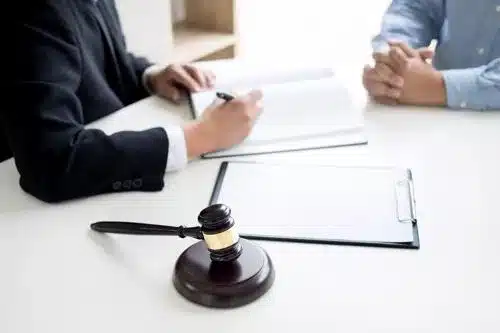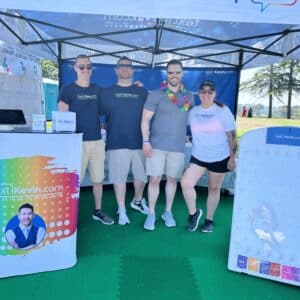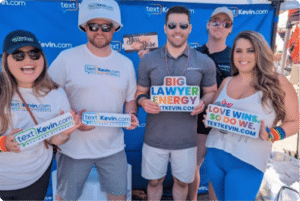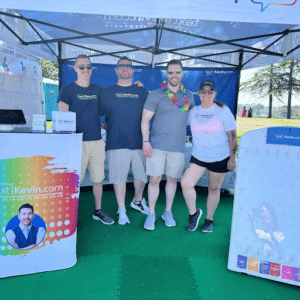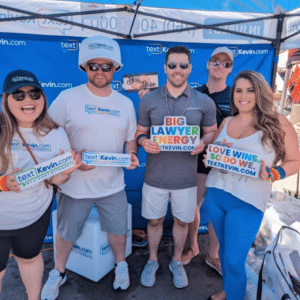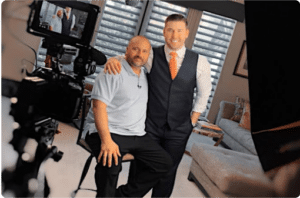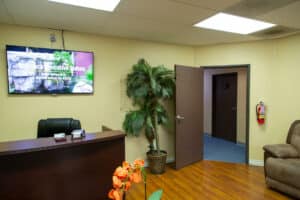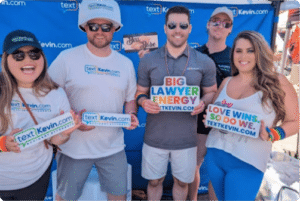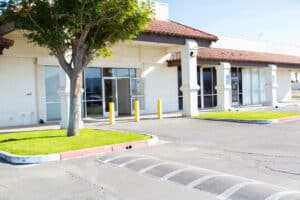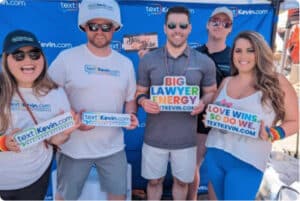Orange County PTSD Lawyer

TABLE OF CONTENTS
According to the National Center for PTSD, close to 10% of the population will suffer from Post-Traumatic Stress Disorder (PTSD) at some point in their lives.
The condition is most well-known for affecting soldiers that come home from war, but many other types of trauma can also trigger the onset of this disorder. Accident victims often suffer from a combination of physical and psychological injuries, but it’s also possible to suffer from PTSD after an accident even if you did not have a physical injury. When you’re suffering psychologically due to the negligence, recklessness, or intentional act of another person, it’s possible for victims to collect a substantial amount of compensation. An experienced Orange County PTSD lawyer can help you collect money for medical expenses, current and future lost earnings, pain, suffering, and mental distress. Call the personal injury attorneys at Text Kevin Accident Attorneys today to schedule your free consultation and learn more.
TABLE OF CONTENTS
What Is PTSD?
According to the American Psychiatric Association (APA), post-traumatic stress disorder (PTSD) is a difficult-to-treat chronic psychological condition that usually occurs after experiencing or witnessing a terrifying event such as a natural disaster, act of terrorism, war/combat situation, or a serious accident. It can last for months or even years, with triggers that bring back memories of the trauma producing intense emotional and physical reactions. A diagnosis of PTSD requires exposure to a traumatic event, but it doesn’t have to be firsthand. It can occur as a result of being told about the violent death of a close family member.
Can You Get PTSD From a Car Accident?
Car accidents are not the leading cause of PTSD in the United States. However, the more serious an accident is, the more likely it is that you’ll suffer from PTSD in addition to any physical injuries you sustain. Head-on collisions, where you can see a vehicle coming at you at high speed before the impact are likely to cause flashbacks and other symptoms. Rollover accidents where unbelted passengers are ejected from a vehicle can cause PTSD for both the person that was ejected and those that witnessed it. Truck accidents, especially those that involve fires and explosions, often trigger long term PTSD. In some cases, PTSD can be debilitating after a low impact collision that did not cause serious injuries. When people relive the feeling of narrowly surviving something that could have been much worse, they can become afraid to even be a passenger in a vehicle.
How Do You Treat PTSD?
If you’re suffering from PTSD, there is therapy and medication available that can help you recover. The goals of treatment are to improve symptoms, develop coping skills, and restore self-esteem. The following types of therapy are used to treat PTSD:
CBT
Cognitive-behavioral therapy works to change thought patterns that cause disturbances.
PET
Prolonged exposure therapy uses breathing techniques that can be helpful. This is especially effective when combined with medications to reduce your stress level as you are given increasing exposure to being in a car, driving at escalating speeds, or being comfortable as a passenger in a vehicle.
CPT
Cognitive Processing Therapy involves writing about the event and discussing ways to process the trauma with a therapist.
EMDR
Eye Movement Desensitization and Reprocessing is a technique where you think about the events while concentrating your vision on a flashing light or a sound with a view towards changing how you feel about the trauma.
Medication
Medications in conjunction with therapy are the most effective way to treat PTSD. These are some of the medications that have been successful:
- Fluoxetine (Prozac)
- Paroxetine (Paxil)
- Sertraline (Zoloft)
- Venlafaxine (Effexor)
- Antipsychotics
- Beta-blockers
- Benzodiazepines
Not all of the above medications have been approved by the FDA for use with PTSD but using “off label” medications can often help find the one that helped most, as people react differently to psychiatric medications.
How Long Does PTSD Last After A Car Accident?
PTSD is one of the most challenging psychiatric illnesses to treat. It’s rare that treatment is effective quickly and can take many months or even years for real improvement. Medications have side effects that may require trying several different types and combinations before they are helpful at all. It’s also common for improvements to come in waves, with regressions that can last months or years in between. Sometimes there is no real impact from years of treatment and the person must learn to live for the rest of their life with intrusive thoughts, phobias, and other symptoms.
How Much Compensation Do You Get for PTSD After A Car Accident?
The amount of compensation you can expect to collect for a PTSD injury in Orange County will depend greatly on:
- How well you respond to treatment
- How long your case takes to respond to treatment
- How much time you lost from work as a result of your PTSD
- Whether or not the condition has permanency
For example, if you’re in a car accident and become a victim of catastrophic injuries, you could collect a very substantial amount of compensation even if you had no physical injuries. If the trauma prevented you from working, driving, and caring for your home and children, this would be sufficient for a very large settlement or verdict.
FURTHER READING
Call Our Orange County PTSD Lawyers Today
You can count on our Orange County PTSD attorneys at Text Kevin Accident Attorneys to know how to collect the largest amount of money possible to pay for medical treatment, reimburse you for your lost earnings, and compensate you for your pain, suffering, and mental anguish. We’ll launch a thorough investigation of your case, ensuring that we have the evidence to present a strong case on your behalf. We offer a free consultation to discuss your case and our legal strategy so you will have a complete understanding of all issues. Please call (888) 965-3827 today to make an appointment.
Kevin received both his bachelor’s degree and law degree from the University of California, Irvine. He is the managing partner of Text Kevin Accident Attorneys and is recognized as a standout in plaintiffs’ litigation for personal injury law by Best Lawyers, the oldest and most respected legal peer-review publisher. Kevin has written for several law magazines and is an award-winning car accident lawyer in California.
Orange County Practice Areas
Get started fast with tailored solutions for your accident claim
Car Accident
- Get support for your injury claim
- Secure compensation with proven success
- Strategize to win and maximize your value

Personal Injury
- Evaluate medical records for details and severity
- Negotiate settlements with insurance companies
- Represent clients in court for litigation
Truck Accident
- Investigate liability to determine fault
- Pursue maximum compensation from insurers
- Navigate complex regulations for successful claims
Motorcycle Accident
- Investigate causes to establish liability
- Pursue compensation from at-fault parties
- Navigate legal complexities for effective claims
Wrongful Death
- Establish liability in fatal accidents
- Pursue compensation for loss and suffering
- Navigate intricate legal paths for justice
Bicycle Accident
- Establish fault in bicycle collision investigations
- Pursue compensation for injuries and damages
- Navigate legal complexities for fair resolution
Catastrophic Injury
- Get a free consult for potential compensation
- Establish a robust legal strategy
- Pursue litigation avenues for your injury claim
Pedestrian Accident
- Rapid injury evaluation for pedestrian accident cases
- Swift and strategic legal support for victims
- Maximize compensation with proactive legal guidance
Brain Injury
- Maximize compensation for traumatic brain injuries
- Swiftly resolve cases for financial relief
- Experience compassionate guidance for your TBI
Spinal Cord Injury
- Optimize compensation for spinal cord injury victims
- Navigate legal intricacies with effective representation
- Offer empathetic support throughout your recovery
Uber Accident
- Drive your Uber accident claim to success
- Chart a clear route through insurance complexities
- Cruise through legal challenges with our support
Drunk Driving Accident
- Championing justice for DUI crash survivors
- Crafting powerful cases for injury compensation
- Hold responsible parties accountable for their actions
Hit and Run Accident
- Swift investigation of unidentified perpetrators
- Skillful navigation through complex legal processes
- Hold accountable those who flee the scene
More winning, less hassle with us
Transform car accident challenges into triumphs with our dedicated legal support.
- Get support for your injury claim
- Secure compensation with proven success
- Strategize to win and maximize your value

Kevin Crockett, Managing Partner
"Experience unity at our firm as I bring legal teams together for seamless collaboration and communication, ensuring successful navigation of car accident cases."
Answers, support, & solutions all in one place
Transform personal injury challenges into triumphs with our dedicated legal support.
- Evaluate medical records for details and severity
- Negotiate settlements with insurance companies
- Represent clients in court for litigation

Kelly Gales, Attorney
"Our legal team significantly accelerates personal injury claims, reducing delays when you choose us for your case."
The complete legal solution
Transform truck accident challenges into triumphs with our dedicated legal support.
- Investigate liability to determine fault
- Pursue maximum compensation from insurers
- Navigate complex regulations for successful claims

Kayla Johns, Case Manager
“At Text Kevin, we keep clients informed with crucial updates, paving the way for successful resolutions in every case we handle.”
Deliver results on time, all the time
Transform motorcycle accident challenges into triumphs with our dedicated legal support.
- Investigate causes to establish liability
- Pursue compensation from at-fault parties
- Navigate legal complexities for effective claims

Mike Buhler, Intake Manager
“Streamline communication with insurers and eliminate headaches when you partner with us for your injury claim.”
Succeed on claims with your team
Transform wrongful death challenges into triumphs with our dedicated legal support.
- Establish liability in fatal accidents
- Pursue compensation for loss and suffering
- Navigate intricate legal paths for justice

Helen Vu, Junior Case Manager
“You can easily share documents and photos with our team, and we’ll handle the rest for a seamless resolution of your case.”
Total commitment to guide you through
Transform bicycle accident challenges into triumphs with our dedicated legal support.
- Establish fault in bicycle collision investigations
- Pursue compensation for injuries and damages
- Navigate legal complexities for fair resolution

Ryan Gloudeman, Law Clerk
“With Text Kevin, you can regain lost hours managing claims yourself. We not only save you time, but expedite the process.”
Manage most any type of claim
Transform catastrophic injury challenges into triumphs with our dedicated legal support.
- Get a free consult for potential compensation
- Establish a robust legal strategy
- Pursue litigation avenues for your injury claim

Jonathan Haskett, Marketing Coordinator
“Stay connected throughout your case with quick and easy text communication, ensuring regular updates and timely alerts on the next steps.”
Forge results your way
Transform pedestrian accident challenges into triumphs with our dedicated legal support.
- Rapid injury evaluation for pedestrian accident cases
- Swift and strategic legal support for victims
- Maximize compensation with proactive legal guidance

Garrett Syke, Case Assistant
“We simplify your injury claim by organizing your case and narrating your story to the insurance company so you don’t have to.”
Never face legal battles alone again
Transform brain injury challenges into triumphs with our dedicated legal support.
- Maximize compensation for traumatic brain injuries
- Swiftly resolve cases for financial relief
- Experience compassionate guidance for your TBI

Kevin Crockett, Managing Partner
“We help visualize what results you want from your injury case and adjust our strategies to help you achieve it.”
Set your path to legal success
Transform spinal cord injury challenges into triumphs with our dedicated legal support.
- Optimize compensation for spinal cord injury victims
- Navigate legal intricacies with effective representation
- Offer empathetic support throughout your recovery

Craig Crockett, Partner
“Leverage our legal team to passionately advocate for you and witness us fight to achieve the results you’re looking for.”
Collaborate on solutions together
Transform Uber accident challenges into triumphs with our dedicated legal support.
- Drive your Uber accident claim to success
- Chart a clear route through insurance complexities
- Cruise through legal challenges with our support

Kelly Gales, Attorney
“Initiate and schedule meetings instantly with our legal team, ensuring prompt notifications on the progress of your case at every step.”
Lead your case to legal success
Transform DUI accident challenges into triumphs with our dedicated legal support.
- Championing justice for DUI crash survivors
- Crafting powerful cases for injury compensation
- Hold responsible parties accountable for their actions

Craig Crockett, Partner
"At Text Kevin, we value your time and expedite claim processes, providing efficient and exceptional service."
Teamwork makes claims work every time
Transform hit & run accident challenges into triumphs with our dedicated legal support.
- Swift investigation of unidentified perpetrators
- Skillful navigation through complex legal processes
- Hold accountable those who flee the scene

Mike Buhler, Intake Manager
“Here, we're all about teamwork, ensuring seamless collaboration among legal teams for successful case outcomes.”
Why Clients Love Text Kevin
Top-rated car accident lawyers recognized for excellence and trusted for maximum compensation in cases.

Million Dollar Advocates
Member
Rising Stars
2023
Ones To Watch
2024
Clients Love Us

Clients’ Choice
10.0
Attorney Of The Month
2021
Client Champion
2024

Curt Schultz
“Get an attorney like Kevin that is experienced and will actually manage your case. I was lucky to have found him”
Car Accident

Rick Werlin
“JUSTICE was served. Thank you for your knowledge and unwavering due diligence on my behalf!”
Pedestrian Accident

Jeffrey Marx
“Crockett and his team made my first car crash experience so much easier than I expected. Thanks team!”
Car Accident


Case Results
Explore our showcased victories in personal injury, where we turned challenges into triumphs for our clients.

$2.75M
Rideshare Driver
2020

$1.30M
Car Passenger
2023
$1.25M
Wheelchair Pedestrian
2019

$1.045M
Police Car Detainee
2023


Our California Offices
IRVINE
ANAHEIM
SANTA ANA
MORENO VALLEY
NORWALK
INDIO
PALM SPRINGS
Overview
Reviews
Photos
Services
About
Reviews
Services
- Car Accident Lawyer
- Personal Injury Lawyer
- Motorcycle Accident Lawyer
- Truck Accident Lawyer
- Wrongful Death Lawyer
- Slip and Fall Lawyer
- Dog Bite Lawyer
- Bicycle Accident Lawyer
- Pedestrian Accident Lawyer
- Traumatic Brain Injury Lawyer
- Uber Accident Lawyer
- Catastrophic Injury Lawyer
- Spinal Cord Injury Lawyer
- Burn Injury Lawyer
About
I'm Kevin Crockett, your Irvine based personal injury lawyer at Text Kevin Accident Attorneys. Specializing in various accidents, we secure victories for our clients with a proven track record. You only pay when we win. Serving Spanish speakers, we offer free 24/7 consultations for reliable legal support in Orange County.
Services
-
Free consult
-
Onsite services
Language
-
English fluent
-
Spanish fluent
-
Vietnamese fluent
Accessibility
-
Wheelchair accessible
Amenities
-
Restroom
-
Free parking
Crowd
-
LGBTQ+ friendly
Availability
-
Open 24 hrs.
Overview
Reviews
Photos
Services
About
Reviews
Services
About
I'm Kevin Crockett, your Anaheim based personal injury lawyer at Text Kevin Accident Attorneys. Specializing in various accidents, we secure victories for our clients with a proven track record. You only pay when we win. Serving Spanish speakers, we offer free 24/7 consultations for reliable legal support in Orange County.
Services
-
Free consult
-
Onsite services
Language
-
English fluent
-
Spanish fluent
-
Vietnamese fluent
Accessibility
-
Wheelchair accessible
Amenities
-
Restroom
-
Free parking
Crowd
-
LGBTQ+ friendly
Availability
-
Open 24 hrs.
Overview
Reviews
Photos
Services
About
Reviews
Services
- Car Accident Lawyer
- Personal Injury Lawyer
- Motorcycle Accident Lawyer
- Truck Accident Lawyer
- Wrongful Death Lawyer
- Slip and Fall Lawyer
- Dog Bite Lawyer
- Bicycle Accident Lawyer
- Pedestrian Accident Lawyer
- Traumatic Brain Injury Lawyer
- Uber Accident Lawyer
- Catastrophic Injury Lawyer
- Spinal Cord Injury Lawyer
- Burn Injury Lawyer
About
I'm Kevin Crockett, your Santa Ana based personal injury lawyer at Text Kevin Accident Attorneys. Specializing in various accidents, we secure victories for our clients with a proven track record. You only pay when we win. Serving Spanish speakers, we offer free 24/7 consultations for reliable legal support in Orange County.
Services
-
Free consult
-
Onsite services
Language
-
English fluent
-
Spanish fluent
-
Vietnamese fluent
Accessibility
-
Wheelchair accessible
Amenities
-
Restroom
-
Free parking
Crowd
-
LGBTQ+ friendly
Availability
-
Open 24 hrs.
Overview
Reviews
Photos
Services
About
Reviews
Services
- Car Accident Lawyer
- Personal Injury Lawyer
- Motorcycle Accident Lawyer
- Truck Accident Lawyer
- Wrongful Death Lawyer
- Slip and Fall Lawyer
- Dog Bite Lawyer
- Bicycle Accident Lawyer
- Pedestrian Accident Lawyer
- Traumatic Brain Injury Lawyer
- Uber Accident Lawyer
- Catastrophic Injury Lawyer
- Spinal Cord Injury Lawyer
- Burn Injury Lawyer
About
I'm Kevin Crockett, your Moreno Valley based personal injury lawyer at Text Kevin Accident Attorneys. Specializing in various accidents, we secure victories for our clients with a proven track record. You only pay when we win. Serving Spanish speakers, we offer free 24/7 consultations for reliable legal support in the Inland Empire.
Services
-
Free consult
-
Onsite services
Language
-
English fluent
-
Spanish fluent
-
Vietnamese fluent
Accessibility
-
Wheelchair accessible
Amenities
-
Restroom
-
Free parking
Crowd
-
LGBTQ+ friendly
Availability
-
Open 24 hrs.
Overview
Reviews
Photos
Services
About
Reviews
Services
About
I'm Kevin Crockett, your Norwalk based personal injury lawyer at Text Kevin Accident Attorneys. Specializing in various accidents, we secure victories for our clients with a proven track record. You only pay when we win. Serving Spanish speakers, we offer free 24/7 consultations for reliable legal support in Los Angeles County.
Services
-
Free consult
-
Onsite services
Language
-
English fluent
-
Spanish fluent
-
Vietnamese fluent
Accessibility
-
Wheelchair accessible
Amenities
-
Restroom
-
Free parking
Crowd
-
LGBTQ+ friendly
Availability
-
Open 24 hrs.
Overview
Reviews
Photos
Services
About
Reviews
Services
About
I'm Kevin Crockett, your Indio based personal injury lawyer at Text Kevin Accident Attorneys. Specializing in various accidents, we secure victories for our clients with a proven track record. You only pay when we win. Serving Spanish speakers, we offer free 24/7 consultations for reliable legal support in the Coachella Valley.
Services
-
Free consult
-
Onsite services
Language
-
English fluent
-
Spanish fluent
-
Vietnamese fluent
Accessibility
-
Wheelchair accessible
Amenities
-
Restroom
-
Free parking
Crowd
-
LGBTQ+ friendly
Availability
-
Open 24 hrs.
Overview
Reviews
Photos
Services
About
Reviews
Services
- Car Accident Lawyer
- Personal Injury Lawyer
- Motorcycle Accident Lawyer
- Truck Accident Lawyer
- Wrongful Death Lawyer
- Slip and Fall Lawyer
- Dog Bite Lawyer
- Bicycle Accident Lawyer
- Pedestrian Accident Lawyer
- Traumatic Brain Injury Lawyer
- Uber Accident Lawyer
- Catastrophic Injury Lawyer
- Spinal Cord Injury Lawyer
- Burn Injury Lawyer
About
I'm Kevin Crockett, your Palm Springs based personal injury lawyer at Text Kevin Accident Attorneys. Specializing in various accidents, we secure victories for our clients with a proven track record. You only pay when we win. Serving Spanish speakers, we offer free 24/7 consultations for reliable legal support in the Coachella Valley.
Services
-
Free consult
-
Onsite services
Language
-
English fluent
-
Spanish fluent
-
Vietnamese fluent
Accessibility
-
Wheelchair accessible
Amenities
-
Restroom
-
Free parking
Crowd
-
LGBTQ+ friendly
Availability
-
Open 24 hrs.


Get a FREE Case Review
100% Secure & Confidential


